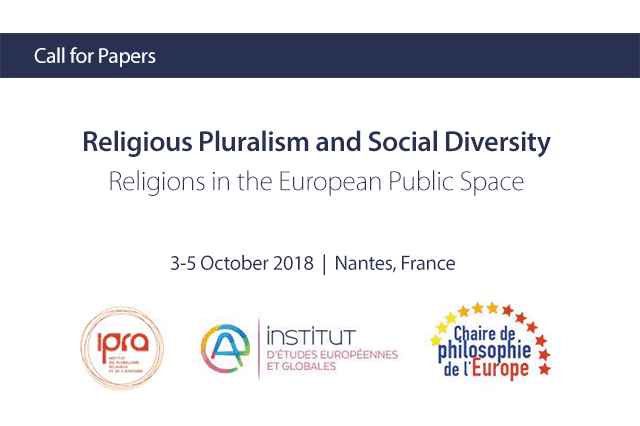Religious Pluralism and Social Diversity: Religions in the European Public Space

About The Event
Call for Papers
Date: October 3-5, 2018
Venue: Nantes, France
Submission Deadline: September 1, 2017
“Identity”, wrote historian Tony Judt, “is a dangerous word”. Indeed, identity politics today, often based on essentialized, ahistorical notions of religion and nation, call into question the bases of pluralistic, multi-ethnic and multireligious societies in Europe and beyond.
This conference will explore some of the ways in which cultural and religious pluralism has always been a central element of European society and how it continues to be so today. We will look at how various European states have accommodated religion in general and diverse religious organizations, paying particular attention to questions of group identity and individual freedoms and of the distinctions between public and private space. We will remain attentive to the networks of exchange and the relations between societies and states in constant flux.
We will bear in mind the constant question of the difficult definition of “Europe”, of which European states and societies we are discussing. Today’s Europe, often simplistically identified with a specific political project, the European Union, and with its relations with its Mediterranean and eastern neighbors, is not the same Europe as that of 1914, much less that of the Middle Ages or the 16th century. The European confessional landscape has been both consistently diverse and constantly in flux. Religions constantly change, or perhaps better said, believers and practitioners constantly adapt their religion to changing social and political realities.
Many faithful of, for example, Christianity or Islam, tend to think of their religions as eternal or immutable: calls to change or “reform” doctrine or practice are often pitched as efforts to “return” to a lost original purity of the religion’s putative apogee: the age of the Apostles, of the Prophet and his Companions, a thirteenth-century “Golden Age” of the Church, etc. This tends to essentialize religion and can lead to fundamentalism, and to doctrinaire rejection of rival versions of one’s own religion (Rabbinic Judaism/Karaism, Catholicism/Protestantism/Eastern Christianity or Sunnism/Shiism) and of elements of secular modernity. Such essentialization by those outside of a religious tradition can lead them to reject it as “backward” or incompatible with contemporary values of secularism.
This conference will explore Europe’s religious heritage through a series of five academic sessions on key themes (papers may be given in French or in English). It also proposes a series of workshops (in French) aimed at a larger audience, of professionals and policy makers, interested in the challenges and possibilities that diversity in religious practice and belief pose to 21st century societies.
Academic Workshops
- Workshop 1: Defining religion
- Workshop 2: Secularization and pluralism in European society.
- Workshop 3: Religious politics in Europe’s colonial empires
- Workshop 4: Religious pluralism in the Muslim world
- Workshop 5: Religion in a globalized world: secularization, commercialization, re-enchantment.
Submission Guidelines
Submissions are invited from scholars in all academic fields. We in particular invite submissions from PhD students. Proposals for a 30-minute paper may be submitted, by 1 September 2017, to ipra@univ-nantes.fr.
More information at: The Institute for Religious Pluralism and Atheism (IPRA)


We're always eager to hear from you.
If you’d like to learn more about us or have a general comments and suggestions about the site, email us at